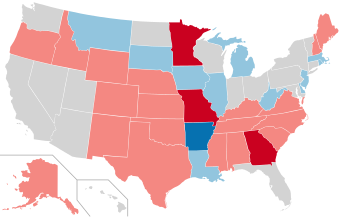
Back ھەڵبژاردنەکانی ویلایەتە یەکگرتووەکانی ئەمریکا (٢٠٠٢) CKB Wahlen in den Vereinigten Staaten 2002 German
| ← 2000 2001 2002 2003 2004 → Midterm elections | |
| Election day | November 5 |
|---|---|
| Incumbent president | George W. Bush (Republican) |
| Next Congress | 108th |
| Senate elections | |
| Overall control | Republican gain |
| Seats contested | 34 of 100 seats (33 seats of Class II +1 special election) |
| Net seat change | Republican +2 |
 | |
| 2002 Senate election results map | |
| House elections | |
| Overall control | Republican hold |
| Seats contested | All 435 voting seats |
| Popular vote margin | Republican +4.8% |
| Net seat change | Republican +8 |
 | |
| 2002 House of Representatives results (territorial delegate races not shown) | |
| Gubernatorial elections | |
| Seats contested | 38 (36 states, 2 territories) |
| Net seat change | Democratic +3 |
 | |
| 2002 gubernatorial election results | |
| Legend | |
| Republican hold Republican gain Democratic hold Democratic gain Independent hold | |
The 2002 United States elections were held on November 5, in the middle of Republican President George W. Bush's first term. Republicans won unified control of Congress, picking up seats in both chambers of Congress, making Bush the first president since Franklin D. Roosevelt in 1934 to gain seats in both houses of Congress. In the gubernatorial elections, Democrats won a net gain of one seat. The elections were held just a little under fourteen months after the September 11 attacks. Thus, the elections were heavily overshadowed by the War on Terror.
Republicans won a net gain of two seats in the Senate and so gained control of a chamber that they had lost in 2001 after Senator Jim Jeffords left the Republican Party. Republicans picked up eight seats in the House of Representatives, making this one of three mid-term elections in which the party of the incumbent president did not lose seats in either the House or the Senate (the other two being 1934 and 1998). It was the sixth midterm election in which the President's party increased its number of seats in the House, after 1814, 1822, 1902, 1934, and 1998. Along with the Senate elections of 1914, 1934, 1962, 1970, 2018, and 2022, this was the seventh of eight times that the President's party gained seats in a midterm election since the passage of the 17th Amendment.
This is the only election in history where the President's party gained a chamber of Congress in a midterm election, the most recent midterm in which the President's party did not lose control of at least one house of Congress, and the most recent midterm election in which a political party maintained a trifecta on the government.